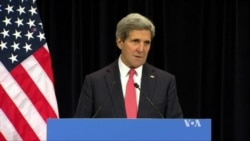U.S. Secretary of State John Kerry says it will take years to defeat the Islamic State militants, but that coalition airstrikes against the insurgents have made it "much harder" for them to launch new attacks.
Kerry spoke Wednesday in Brussels, opening a meeting with foreign ministers from 60 coalition partners to discuss efforts to combat the militant group that took over large areas of northern and western Iraq and eastern Syria earlier this year.
"One outcome of this meeting will be a statement that encompasses our message: that we are united and moving ahead on all fronts and that we will engage in this campaign for as long as it takes to prevail," Kerry said.
He said the militants must worry about what will come down on them from the sky, and that the U.S.-led airstrikes will continue as necessary while training and assistance for Iraq's security forces expand.
So far, the coalition has carried out more than 1,000 airstrikes in Iraq and Syria since the campaign began in August.
Syria denies strikes' usefulness
However, Syrian President Bashar al-Assad said U.S.-led strikes in Syria have made no difference and described himself as a captain trying to save his ship, in comments to French magazine Paris Match and carried by the presidency's Twitter feed on Wednesday.
Asked whether airstrikes against Islamic State militants in Syria have been helpful to him, Assad, whose forces have fought the same groups, told Paris Match: “You can't end terrorism with aerial strikes.
“Troops on the ground that know the land and can react are essential. That is why there haven't been any tangible results in the two months of strikes led by the coalition,” he said, according to interview extracts on Paris Match's website in English.
“It isn't true that the strikes are helpful. They would of course have helped had they been serious and efficient. We are running the ground battles against Daesh [Arab acronym for the Islamic State group], and we have noticed no change, especially with Turkey providing direct support to these regions," Assad was quoted as saying.
Turkey denies Syrian accusations that it backs Islamist insurgents like Islamic State fighters in Syria.
Iranian airstrikes
Iran, meanwhile, would not confirm U.S. assertions that it carried out airstrikes on Islamic State militants inside Iraq, close to its border.
U.S. military officials said American-built jets that Iran bought in the 1970s hit Islamic State targets in eastern Diyala province. The Pentagon said the U.S. does not operate in that area.
No other information on the airstrikes was available. Iraqi Prime Minister Haider al-Abadi said he was unaware of any air action in Diyala.
Both Iran and the United States hastened to say there is no military cooperation between them.
White House spokesman John Earnest said "the wisdom of cooperating" militarily with Iran has not changed, and that it will not happen. A top Iranian official said working with the Americans is "out of the question."
Also Wednesday, a top U.S. general said the Islamic State has set up training camps in eastern Libya.
General David Rodriguez said the Pentagon was ruling out any military strike on those camps at this time, calling the activities there small and nascent. He said the Pentagon suspected those inside the camps were local militias trying to make connections and that officials would monitor the situation.
Woman linked to IS detained
Meanwhile, Iraq's interior ministry said Wednesday that a woman detained in Lebanon is not the wife of Islamic State group leader Abu Bakr al-Baghdadi.
Lebanese officials said Tuesday that Lebanon's military had detained a wife and child of Baghdadi near the border with Syria, and that they were being questioned at the defense ministry.
But Iraqi interior ministry spokesman Saad Maan said the woman is actually the sister of another man, Omar Abdul Hamid al-Dulaimi, a terror suspect being held in Iraq.






